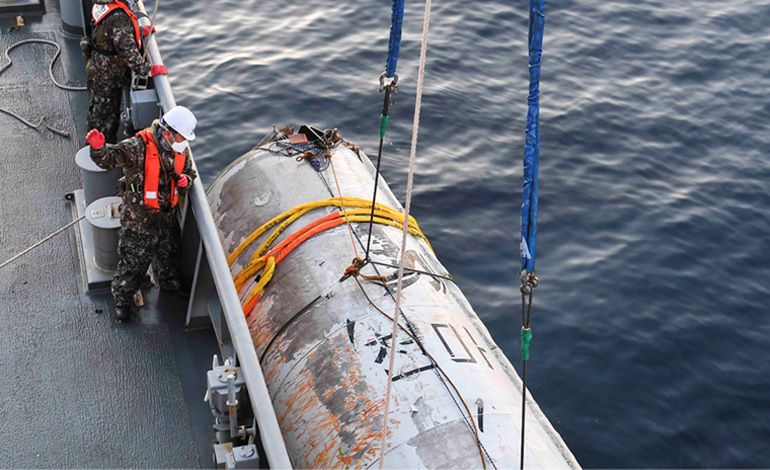Experts say it could help determine Pyongyang’s nuclear capabilities

South Korea has recovered a portion of the rocket used in North Korea’s failed satellite launch, according to reports. The rocket debris was found in waters off the country's west coast on Thursday.
The move comes after North Korea launched a missile last week that flew over Japan and landed in the Pacific Ocean, an act described by Japanese Prime Minister Shinzo Abe as an “unprecedented, grave, and serious threat.”
The rocket debris recovery is seen as significant as it could help experts determine the extent of North Korea’s nuclear capabilities. The rocket, which was launched in February 2016, was believed to have been part of North Korea’s attempts to develop long-range ballistic missiles that could potentially carry nuclear warheads.
According to South Korean officials, the recovered debris included a 30-meter-long section of the rocket's first stage fuel tank. The tank has been taken to a military installation for analysis.
Experts say the recovered debris could help shed light on North Korea’s missile and nuclear programs. The rocket used in the 2016 launch was believed to be an upgraded version of North Korea’s Unha-3 rocket, which was successfully launched in December 2012. The 2012 launch was widely criticized by the international community, as it was seen as a cover for a ballistic missile test in violation of UN sanctions.
In recent years, North Korea has ramped up its missile testing program, carrying out numerous tests in defiance of UN sanctions. The country has claimed that its missile program is aimed at developing a deterrent against US aggression. However, the international community sees the country's missile program as a threat to regional and global peace.
The United Nations Security Council has imposed several rounds of sanctions on North Korea, targeting its nuclear and missile programs. The latest round was passed in August and targeted North Korea’s exports of coal, iron, and seafood in an attempt to cut off the country's sources of foreign revenue.
Despite the sanctions, however, North Korea has continued to carry out missile tests, including two tests of intercontinental ballistic missiles (ICBMs) in July. The tests have raised concerns that North Korea may be close to developing the ability to strike the US mainland with a nuclear-tipped missile.
The rocket debris recovery comes as tensions continue to rise on the Korean Peninsula, with the US and South Korea conducting joint military exercises and North Korea threatening to launch a missile attack on the US territory of Guam.
South Korea's defense ministry has vowed to step up its military preparedness in response to North Korea’s provocations, while the US has warned that all options, including military action, are on the table.
The recovery of the rocket debris is a reminder of the ongoing threat posed by North Korea’s missile program and nuclear ambitions. While the international community continues to apply pressure on North Korea to abandon its nuclear and missile programs, it is unclear whether Pyongyang is willing to back down and engage in meaningful dialogue.
For now, the situation on the Korean Peninsula remains tense, with both sides warning of dire consequences if the other side doesn't back down. As the world watches and waits, the prospects for a peaceful resolution to the crisis appear increasingly remote.